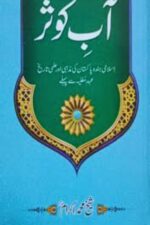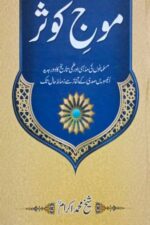Sheikh Muhammad Ikram
Sheikh Muhammad Ikram (Urdu: شیخ محمد اکرام; 10 September 1908 – 17 January 1973), widely recognized as S. M. Ikram, was a distinguished Pakistani historian, biographer, and literary figure. His extensive contributions to Urdu and English literature have left an indelible mark on South Asian historiography and cultural studies.
Early Life and Education
Born in Chak Jhumra, Lyallpur (now Faisalabad), British India, Ikram hailed from a family with a strong administrative background. His father, Sheikh Fazal Kareem, served as a Qanungo, a hereditary revenue officer. Ikram pursued his early education in Lyallpur and later graduated with honors in Persian, English, and Economics from Government College, Lahore, in 1928. He completed his M.A. in English Literature in 1930. In 1931, he joined the Indian Civil Service (ICS) and underwent training at Jesus College, Oxford, from 1931 to 1933.
Civil Service and Academic Career
Upon returning from Oxford, Ikram served in various administrative capacities within the Bombay Presidency until the partition of India in 1947. Opting for Pakistan post-independence, he continued his civil service career and was appointed Director of the Institute of Islamic Culture in Lahore on 1 July 1966, a position he held until his demise in 1973.
Ikram also contributed to academia as a visiting professor at Columbia University in New York during the periods 1953–1954, 1958–1959, and 1961–1962. His tenure at Columbia marked a transition from literary pursuits to historical research, leading him to author works in English that catered to a broader audience.
Literary Contributions
S. M. Ikram’s literary oeuvre encompasses a range of subjects, including history, biography, and Islamic culture. His notable works include:
-
Aab-e-Kausar (1952): A seminal Urdu work detailing the religious and spiritual history of Islamic India.
-
Mauj-e-Kausar (1968): A continuation of his exploration into Islamic history and culture.
-
Armughan-e-Ghalib: A tribute to the renowned poet Ghalib, reflecting Ikram’s deep engagement with Urdu literature.
-
History of Muslim Civilization in India and Pakistan: An English-language work providing a political and cultural history of Muslim civilization in the region.
His writings are characterized by meticulous research and a balanced perspective, making them valuable resources for scholars and general readers alike.
Honors and Recognition
In recognition of his scholarly contributions, Ikram received several prestigious awards:
-
Sitara-i-Imtiaz (1965): A civil award for his meritorious services to literature and education.
-
Pride of Performance (1971): Awarded by the President of Pakistan for his distinguished literary achievements. Wikipedia
-
Nishan-i-Sipas: Conferred by the Government of Iran in acknowledgment of his contributions to literature. Wikipedia
Personal Life
Ikram married Zebunnisa in 1936, and the couple had four children: Hamid, Khalid, Zahid, and Shahida. He passed away on 17 January 1973 in Lahore, leaving behind a rich legacy of scholarly work that continues to influence contemporary studies in history and literature.


